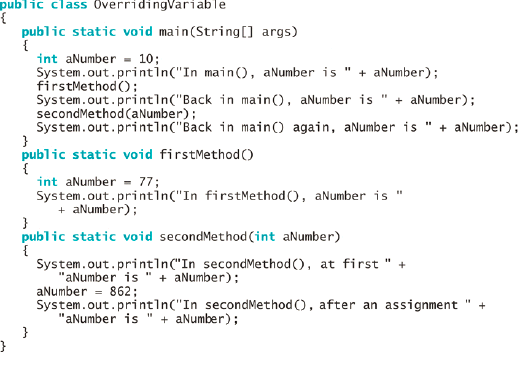 In the above code, what happens to the value of aNumber when the main() method is executed? What happens to the value of aNumber when the firstMethod and secondMethod methods are executed?
In the above code, what happens to the value of aNumber when the main() method is executed? What happens to the value of aNumber when the firstMethod and secondMethod methods are executed?
What will be an ideal response?
Initially, aNumber is declared and assigned the value 10 in the main() method of the OverridingVariable class. When the program calls firstMethod(), a new variable is declared with the same name. However, a different memory address is used and a new value is assigned. The new variable exists only within firstMethod(), where it contains the value 77. After firstMethod() executes and the logic returns to the main() method, the original aNumber is displayed with a value of 10. A copy is made within the method when aNumber is passed to secondMethod(). This copy has the same identifier as the original aNumber, but a different memory address. When the value is changed to 862 and displayed within the secondMethod(), it has no effect on the original variable in main(). When the logic returns to main() after secondMethod(), the original value is displayed again.
You might also like to view...
In the FV function, the rate argument refers to the:
A) repayment type. B) periodic rate. C) total number of periods. D) payment.
Which statement is false?
a. SortedSet extends Set. b. Class SortedSet implements TreeSet. c. When a HashSet is constructed, it removes any duplicates in the Collection. d. By definition, a Set object does not contain any duplicates.